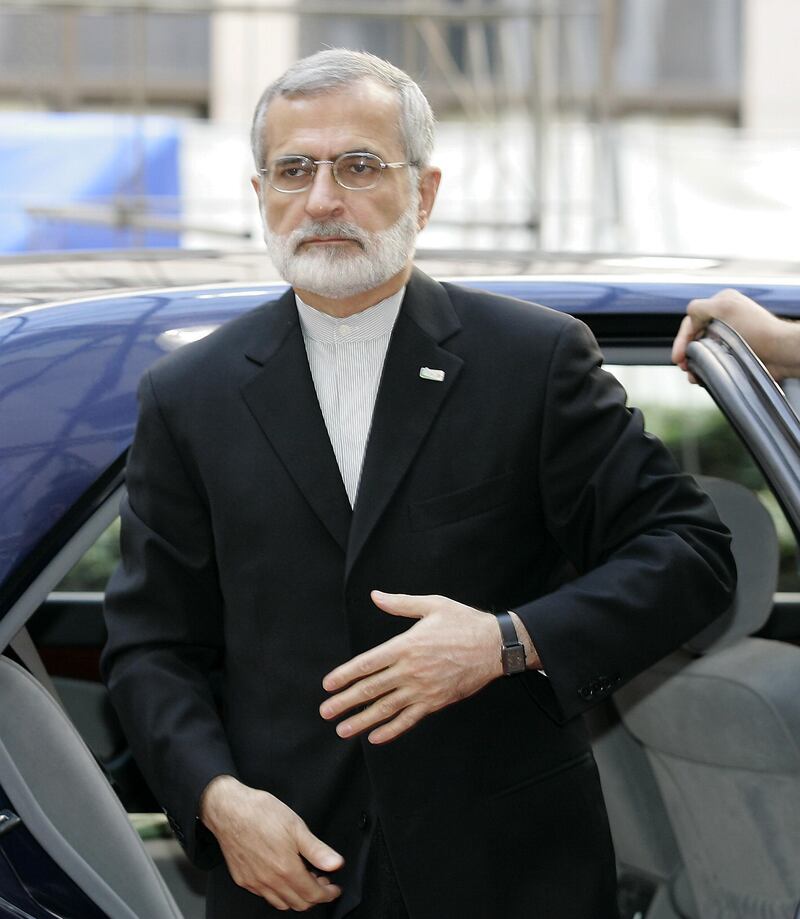An encounter with an old face from the past provided a reminder that Iran’s diplomats are masters of the art of drawing a veil around the messy reality of the country’s role in the world.
Kamal Kharazi is not a man to hog the spotlight. The former Iranian foreign minister was in London last week for a visit that - unlike recent trips by officials from the GCC - made no banner headlines.
Watching him in action, I recalled the first time I had come across this stalwart of Iran’s foreign policy establishment.
At the turn of the century, Iran was led by Mohammed Khatami, who was promoting his signature international policy, dubbed the "dialogue of civilisations". It was all about cultural exchanges and other soft-power interactions. There were many foreign governments that put great store in this overture. His approach was greeted as a vehicle for moderation after the trauma since the ayatollah's takeover two decades before.
Mr Khatami and Mr Kharazi were the frontmen for the dialogue policy. By drawing a contrast with Samuel Huntington's post-Cold War Clash of Civilisations, the two men made an impact with both the West and emerging powers. It was so successful that the UN named 2001 the Year of Dialogue.
On a state visit to Beijing in 2000, where I was then living, the Iranians were hailed for providing thinking that was an alternative to “a unipolar world” - code for America. At the time, the visit stood out as a small sign of a world that was transforming in ways we could not adequately foresee.
The reality behind the rhetoric, however, was that Iran was working to create a clandestine nuclear programme. The deals with the Chinese on the 2000 trip were mainly about missile imports, dual-use technology and arms sales to Iran.
In any case, the 9/11 events soon intervened to set history on a turbulent new path.
It was not too long before Iran would quietly give shelter to the Al Qaeda leadership fleeing Afghanistan and pounce on the overthrow of Saddam Hussein to vastly expand its influence in Iraq.
There was no talk of a dialogue of civilisations on Mr Kharazi’s London tour. Instead he defended Iran’s influence. He defined his country as a spiritual power and pillar of the Middle East "status quo".
When challenged on Iran’s involvement in conflict in Syria and Iraq, Mr Kharazi retorted the governments in Damascus and Baghdad had issued formal requests for assistance. What would be the implications for Europe’s security, he asked the London-based diplomats and others, if Iran had not defended these states?
Yet, Mr Kharazi was speaking as the US state department named his country as the foremost sponsor of terrorism across the globe. Days before the Americans had additionally imposed fresh sanctions on Iranians engaged in suspect trading activity, including a network assisting Tehran’s rapidly developing ballistic missile industry.
The 72-year old’s performance was reminder of the enormous benefit Iran gains from its soft-speaking frontmen. Press coverage of the negotiations that produced the 2015 plan of action on its nuclear programme was always dominated by sympathetic encounters with Harvard or Stanford-educated Iranian ministers.
The idea that the deal was a good thing was largely based on hopes that men like the diplomats can control the republic. This thinking is so powerful that even when a president of the United States questions the deal, as Donald Trump reportedly did at the last minute before last week's certification deadline, his objections count for nothing.
In fact, the nuclear deal has produced a pattern of Iranian behaviour that shows Tehran’s real agenda is far more aggressive than anything Mr Kharazi discussed.
An analysis of Iranian behaviour since 2015 was published by the Henry Jackson Society last week. It broke down the unfolding implications of the deal, making the key point that Iran’s nuclear programme has not been dismantled, but suspended.
Iran has taken a strategic decision to direct investments to build up its oil, shipping and aviation assets since sanctions were lifted. Other commercial sectors have been relegated to secondary importance and there is no prospect of a wider opening up of the country to the outside world.
With sanctions relief, Iran has become ever more assertive in the region. It has opened an air corridor that stretches all the way to the Mediterranean. It has expanded its conventional military capabilities. It has dramatically built up proxy militias. And it has sought rapid advances in the range and types of ballistic missiles in its arsenal.
There was just one glimpse behind the curtain afforded by Mr Kharazi. Quizzed about the infighting between the Revolutionary Guards and president Hassan Rouhani, another western-educated, friendly face in Iranian politics, Mr Kharazi sounded a note of weary exasperation.
Yes, there were differences, he conceded, but Mr Rouhani was fighting his corner.
Finessing that bitter power struggle is beyond even the most silken of advocates.





